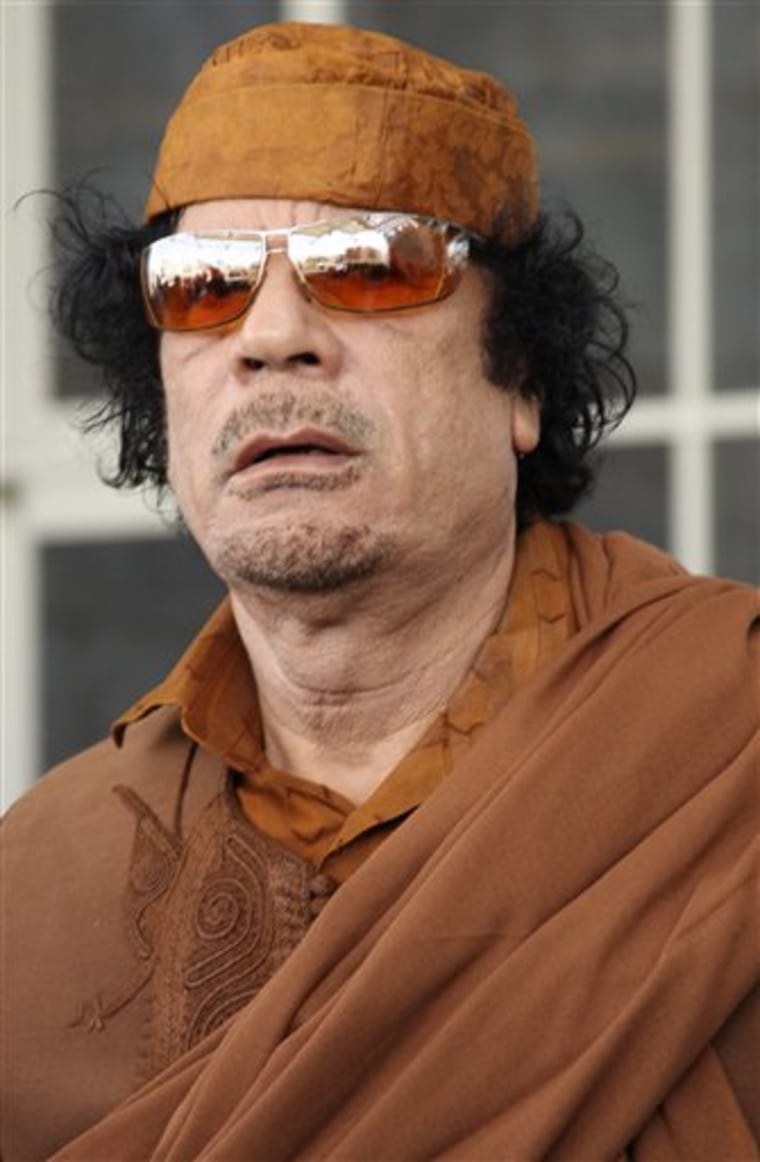Moammar Gadhafi of Libya was elected Monday as leader of the African Union, a position long sought by the eccentric dictator pushing his oil-rich nation into the international mainstream after years of isolation.
Some African leaders offered tepid praise for the choice of Gadhafi, who grabbed power in a 1969 coup. Rights groups called him a poor model for Africa at a time when democratic gains are being reversed in countries such as Mauritania and Guinea.
Once ostracized by the West for sponsoring terrorism, Gadhafi has been trying to increase Libya's presence on the global stage and its regional influence — mediating African conflicts, sponsoring efforts to spread Islam on the continent and pushing for the creation of a single African government.
He attended the session dressed in a gold-embroidered green robe and flanked by seven extravagantly dressed men who said they are the "traditional kings of Africa." Gadhafi told about 20 of his fellow heads of state that that he would work to unite the continent into "the United States of Africa."
4-foot gold staff
Gadhafi arrived at the summit Sunday with the seven men, one carrying a 4-foot gold staff, and caused a stir when security officials did not admit them because each delegation gets only four floor passes. All seven "kings" were seated behind Gadhafi when he accepted the chairmanship.
"I think the coming time will be a time of serious work and a time of action and not words," he said.
The chairmanship of the African Union is a rotating position held by heads of state for one year and gives the holder some influence over the continent's politics but carries no real power.
Diplomats who attended the closed-door meetings in which Gadhafi was chosen said several countries vigorously opposed him, seeking alternatives from Lesotho and Sierra Leone. However, the AU's chairmanship rotates among Africa's regions, and a North African had not been chaired the continental body since 2000, when Algeria held the chairmanship.
Meetings to select the chairman are held in private. The leader is usually nominated and then chosen by consensus. AU officials would not give details of the proceedings, including which countries objected.
Even in public the reception to his appointment — and the acceptance ceremony in which he invited two of the traditional kings to speak — was measured.
'His time has come'
"I think his time has come," Liberian President Ellen Johnson Sirleaf told The Associated Press. "He's worked for it. I think it's up to us to make sure it comes out best."
Since he seized power Gadhafi has ruled the oil-rich state with an iron hand and the often quixotic ideology laid out in his famous "Green Book," which outlines Gadhafi's anti-democratic and economic policies.
In 2007, his regime released five Bulgarian nurses and a naturalized Palestinian doctor after eight years in prison for allegedly infecting Libyan children with HIV. They were released following a deal struck by the European Union that involved payment of millions of dollars in aid to Libya.
"The Libyan government continues to imprison people for criticizing Gadhafi," said Reed Brody, a Brussels-based lawyer with Human Rights Watch who watched Gadhafi take the helm of the AU. "Hundreds more have been 'disappeared.' Libya has no independent NGOs and the government tightly controls all forms of public expression."
The large North African country is perhaps best known for the 1988 downing of a Pan-Am flight over Lockerbie, Scotland. All 259 people on board the flight from Heathrow to New York were killed when a bomb exploded. Another 11 people died on the ground.
The bombing prompted United Nations-imposed sanctions and breaking of diplomatic ties with Britain and the United States.
Libya has paid several billion dollars to the families of Lockerbie victims, and has accepted "general responsibility" for the attack. Sanctions have since been lifted and diplomatic ties re-established.
Terrorism renounced
Gadhafi renounced terrorism in 2003 and Libya has paid out over a billion dollars to the families of the Lockerbie victims.
Libya has also entered into deals with major oil companies for exploitation of its reserves and re-established diplomatic ties with the U.S.
Gadhafi has also been involved in mediating the conflict in Darfur with little success. He has mediated between Chad and Sudan — both have accused each other of supporting the other's rebel groups. The Libyan leader's mediation has resulted in deals between Chad and Sudan, which have later been violated.
Libya has never held the chairmanship in the 46-year-history of the African Union and its predecessor, the Organization of African Unity. This contributed to his being denied the chairmanship of the Organization of African Unity in 1982.
